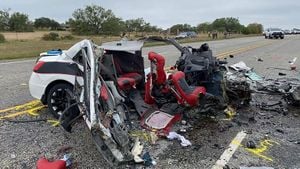The Jakarta Provincial Government is urging active community participation to tackle the city's growing waste management problem, highlighted during the Trash Fest 2025 event held on February 23. "Waste management cannot solely rely on the government," asserted Vice Governor Rano Karno, emphasizing the importance of collective responsibility among citizens.
At the festival, organized to celebrate National Waste Awareness Day (HPSN), Rano highlighted the alarming statistic of Jakarta's daily waste production, which stands at approximately 8,000 tons. He cautioned, "If not managed properly, this waste can pose severe risks to the city's residents, potentially leading to disasters." Rano encouraged residents to start waste segregation at home, particularly focusing on separating plastic waste to help reduce the burden.
Currently, Jakarta’s waste management capabilities are strained by this rising waste volume. The only operational Refuse Derived Fuel (RDF) facility, located at Rorotan, Cilincing, has limited processing capacity, handling just 2,500 tons per day. Rano noted the pressing need for similar facilities to be established across at least four locations within the city to adequately cope with the daily influx of waste. "More facilities need to be built; otherwise, we will continue to face waste overflow issues," he explained.
To address the capacity limits, the RDF facility processes waste from different districts: waste collected from North Jakarta is managed at Rorotan, and waste from the western parts of the city is processed separately. This strategic division aims to alleviate the overall waste management challenges faced by the city. Rano stated, "It is imperative to have additional RDF locations to prevent waste from migrating to adjacent cities. If we don’t take these steps, we will keep encountering our existing waste problems."
The Trash Fest 2025 serves as more than just a local event; it aims to instill sustainable waste management practices among residents and cultivate grassroots involvement. Rano's call to action for community-driven waste solutions reflects the government’s awareness of the need to broaden participation and ownership of waste management from merely government-led initiatives to include every citizen. By engaging the public effectively, the Jakarta government hopes to inspire more sustainable living practices among the residents.
Rano elaborated on the damage uncontrolled waste can bring, not just environmentally but to the overall quality of life for Jakarta's residents. "We need to adopt the practice of separating plastic waste at the source, as this simple act can significantly ease the waste management process," he encouraged. The Vice Governor's remarks spotlighted the significance of public education and advocacy when it involves such community-focused issues.
Overall, the initiative sheds light on the challenges Jakarta faces and the pivotal role the community plays. The provincial government is firm on its stance, advocating collaboration and responsibility and emphasizing the importance of unity in efforts to improve waste management processes. Should the city fail to act collectively, it risks letting waste problems grow, resulting in dire environmental consequences.
With efforts like Trash Fest 2025, the DKI Jakarta government is striving not only to raise awareness but also to push for lasting change and to empower communities by encouraging them to take part actively. Officials are hopeful this collective action will lead to more innovative approaches to waste management and eventually transform Jakarta's waste management approach for the future.



